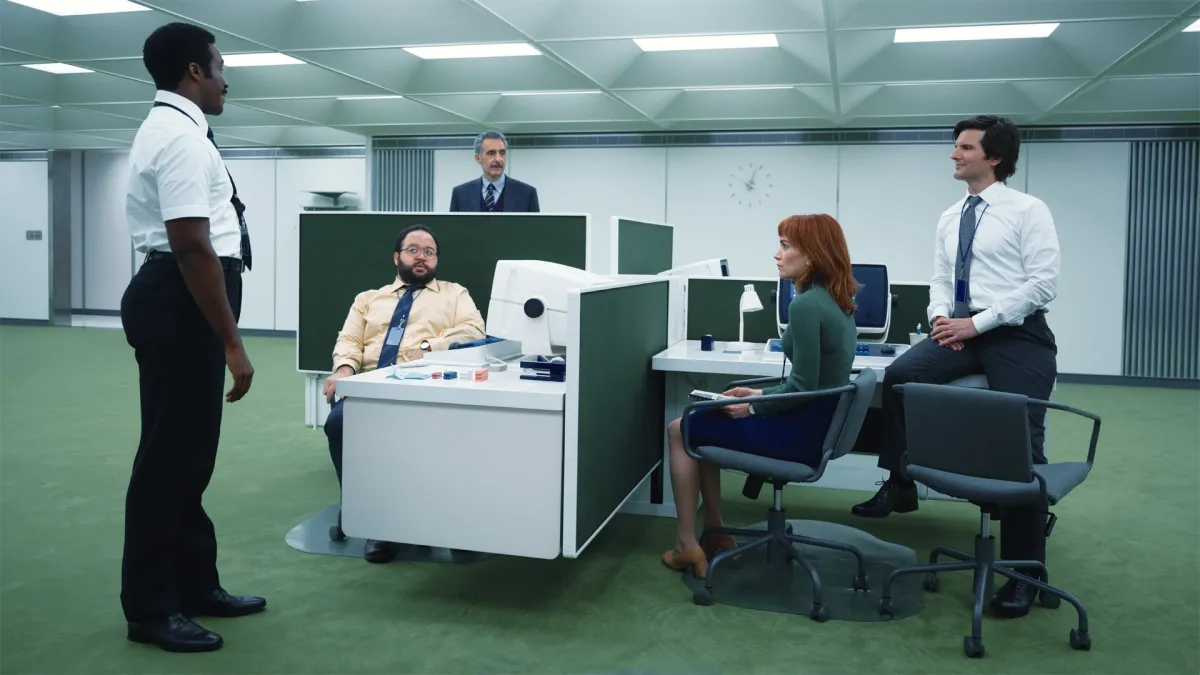At its core, Severance is a high-concept satirical thriller about the horrors of the modern workplace.
The new series from Apple TV+ is built around a relatively complicated central premise. Set in a recognizable world, the show follows a set of employees who work for the mysterious Lumon Industries. Ostensibly to protect the company’s corporate secrets, the employees have voluntarily undergone the eponymous surgical procedure, which involves the implantation of a mechanical chip in the subject’s head to separate their personal and professional memories.
Every weekday morning, Mark Scout (Adam Scott) goes to work. Arriving at the office, he empties his pockets of any personal belongings. He then rides the elevator down to the basement. During that short ride, the chip is activated. Mark becomes a new version of himself, a version with no memory of life outside the office and no experiences beyond its walls. At the end of the working day, Mark rides the elevator back up. He switches back, with no memory of what he did while in the basement.
It is a remarkable hook for a show like this. The show uses the terms “innie” and “outie” to distinguish between the two versions of Mark, and it is clear that Mark is a different person in the office. The show implies that Mark underwent “severance” as a way of dealing with the tragic loss of his wife, effectively choosing to lose himself for eight hours a day. Mark’s “innie” is an innocent, with no memory of his loss, and is so unburdened by it.
Severance ostensibly adopts the structure of a classic “mystery box” show. The most obvious mystery is the question of what exactly Mark and his coworkers are doing every day. They appear to be sorting data, but they cannot explain why and to what end. As the show progresses, the characters try to figure out what Lumon is doing, as they stumble on a set of seemingly bizarre and incongruous elements. Without spoiling anything, Christopher Walken does get to say “baby goats.”

While it follows Mark between its two worlds, Severance preserves a sense of mystery around his coworkers. The show obliquely hints at the lives that Dylan (Zach Cherry), Helly (Britt Lower), and Irving (John Turturro) enjoy outside the office, but they remain enigmas for most of the first season. While Mark is the protagonist of Severance, the show wisely makes Helly its viewpoint character, following Helly from the moment her “innie” awakes in the office, with no idea who she is.
Severance doesn’t introduce these mysteries to set up dramatic plot-driving twists. Instead, these mysteries exist to place the audience squarely inside the perspectives of these characters. There is a strong sense that it doesn’t actually matter what Mark and his coworkers are doing with all that data in the basement. It only matters that their work feels completely disconnected from any tangible or material motivation. It exists in the purest and most abstract form.
In some ways, Severance feels appropriate to the moment. The show was commissioned before the pandemic, with production temporarily halted during the first wave. As such, the resonance is most likely accidental, but it’s still there. There’s a desperate loneliness and isolation to Severance, with its sterile working environment and its extremely regulated human contact. On receiving a promotion, Mark is curtly informed that “a handshake is available on request.”
It’s interesting to watch Severance in an era where so many people seem to be reassessing their relationship to their job – and, in particular, the boundaries between work and the life outside it. Discussing the recent mass departure of people from their jobs, journalist Noreen Malone mused that “all that’s left now is the job itself, naked and alone.” That is one of the truest and most essential horrors of Severance. For Mark’s “innie,” there is no life but the job.

Severance pushes corporate culture to its logical extreme. Dylan obsesses over perks, boasting about his branded collection of Chinese finger traps and striving to reach his targets in the hopes that he might qualify for a “waffle party.” It doesn’t matter that he doesn’t have a pencil; he has earned that eraser. “There’s stuff you don’t even know about,” his supervisor Seth (Tramell Tillman) tries to tempt him late in the season. “Just say the word and I’ll get you a coffee cozy literally right now.”
Similarly, Irving quotes from the company regulations like they are some sacred scripture, chapter and verse. He buys completely into the corporate culture, subsuming his identity to it. He can recite the history of Lumon Industries from memory, as he offers a guided tour through the company’s archives and museum. Of course, none of this substitutes for the longing that Irving seems to feel for any meaningful human affection.
It’s possible to read Severance as a parable about the horrors of human exploitation. After all, the “innies” do all of the work and receive none of the benefits. It may not be a coincidence that Lumon Industries was founded in 1865, the year the Civil War ended. (“History lives in us, whether we learn it or not,” reads a quote attributed to current CEO Jame Eagan.) When one member of the team asks to leave, their “outie” records a message bluntly refusing: “I am a person. You are not.”
One of the most subtly unsettling aspects of Severance is the way that it frames this situation as not just an economic relationship, but as a moral philosophy. Employees who transgress are taken to “the Break Room,” where they are forced to apologize until their interrogator believes that they are truly repentant. It can take hundreds of iterations. At the heart of the basement sits a monument (or a shrine) to founder Kier Eagan, his proclamations on human nature playing over and over.

That said, there is perhaps a more existential and personal horror at the heart of Severance. In many ways, Severance is a human story about the hell that human beings make for themselves. In the first episode, Mark’s boss Harmony (Patricia Arquette) reflects on how her mother told her “good news and bad news about hell. The good news is hell is just the product of a morbid human imagination. The bad news is whatever humans can imagine, they can usually create.”
Severance is not subtle in this. The show is packed with overtly religious imagery, from the basement office to the evocative artwork that depicts nightmarish half-forgotten memories. Goats are a recurring piece of iconography. However, everybody in the office is there because their “outie” consented to the surgical procedure.
“Every time you find yourself here,” Mark tells Helly, “it’s because you chose to come back.” Late in the first episode, Mark’s best friend Petey (Yul Vazquez) confesses, “I used to think it would take a monster to put someone in a place like that office, particularly if that person was himself.” In Mark’s case, he has opted to sublimate his grief over the loss of his wife, subjecting an alternate version of himself to this perpetual existential nightmare as a way of avoiding his own emotional trauma.
As such, Severance is a particularly perverse form of self-torture, one rationalized through a complete rejection of empathy – even for oneself. There is perhaps something profound in this, reflecting studies into why human beings make such self-destructive long-term decisions. In short, there is a tendency to treat one’s future self as a separate person, freeing an individual from any ethical obligation to sacrifice immediate pleasure for long-term gain.

Severance benefits from an impressive production. The series was created by Dan Erickson, and the direction of the nine episodes is split between Ben Stiller and Aoife McArdle. Stiller is a key force on Severance and helped shepherd it through its long development. Stiller’s influence on the finished product is obvious, from the casting of long-term collaborator Patricia Arquette to the show’s blackly comic aesthetic.
Perhaps owing to his movie star persona and the fact that he worked largely in comedy, Stiller is sorely underrated as a director. Reality Bites received a somewhat muted reception on release but has been reclaimed as a snapshot of its moment. The Cable Guy is arguably in the process of a similar rehabilitation, if Super Bowl commercials are to be trusted. Severance is perhaps Stiller’s most arch and stylized project to date, as well as a showcase for both Stiller and McArdle.
Working on what seems to be a reasonable budget, Severance crafts a distinct and unsettling world, often in shades of green or turquoise. Production designer Jeremy Hindle reportedly took his cues from Jacques Tati’s Playtime, while cinematographer Jessica Lee Gagné used Lars Tunbjörk’s portraits of office spaces as a frame of reference. Stiller and McArdle’s direction is highly formalist, carefully framed and often effectively using negative space to disorient the audience.
The result is a show that evokes the science fiction cinema of the 1960s and 1970s, from Stanley Kubrick’s 2001: A Space Odyssey and A Clockwork Orange to François Truffaut’s Fahrenheit 451 to Michael Anderson’s Logan’s Run. It’s unsettling, uncanny, eerie, and effective. It’s also beautiful and haunting, in a way that a story like Severance should be.






Published: Feb 24, 2022 11:00 am